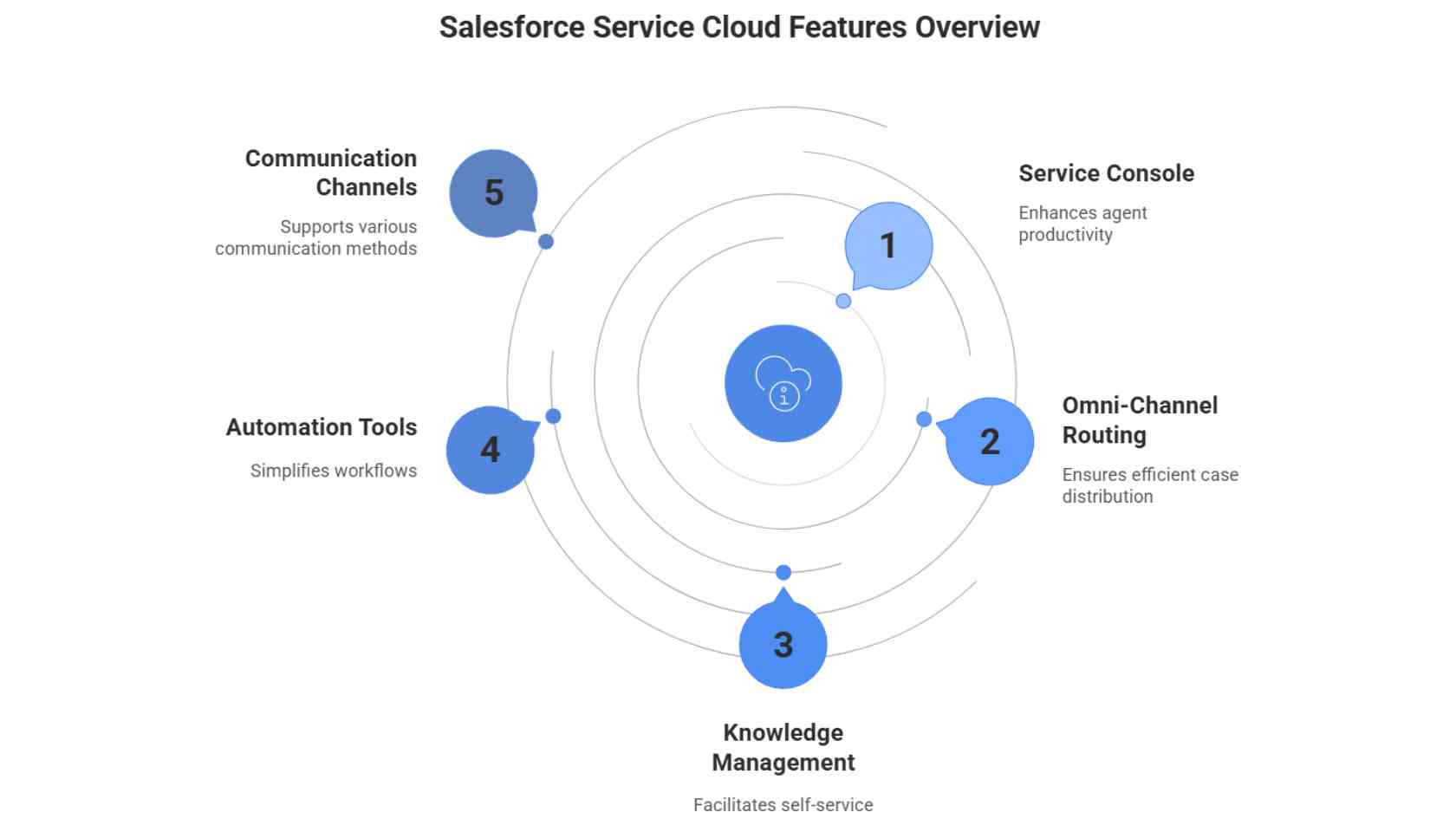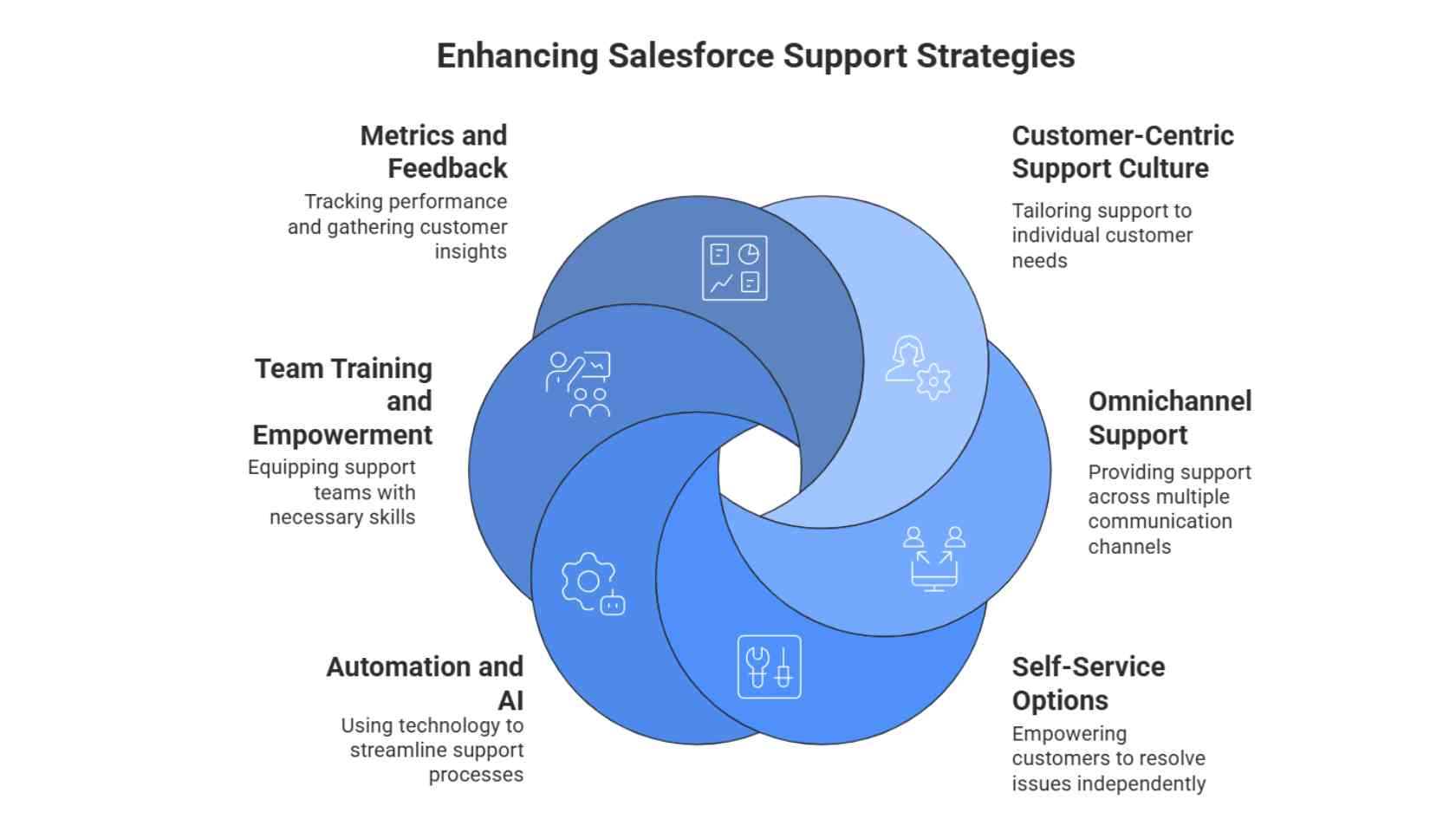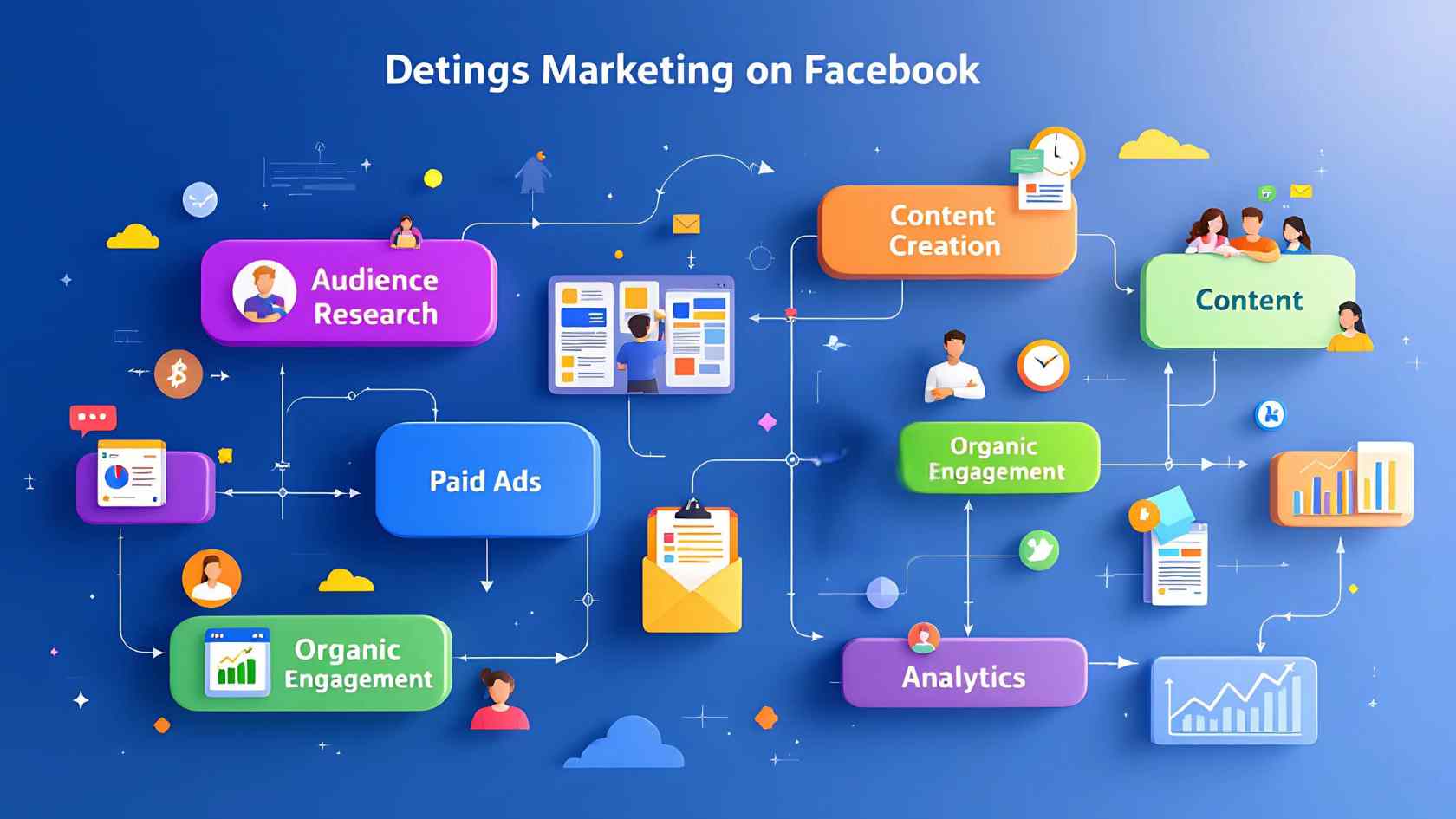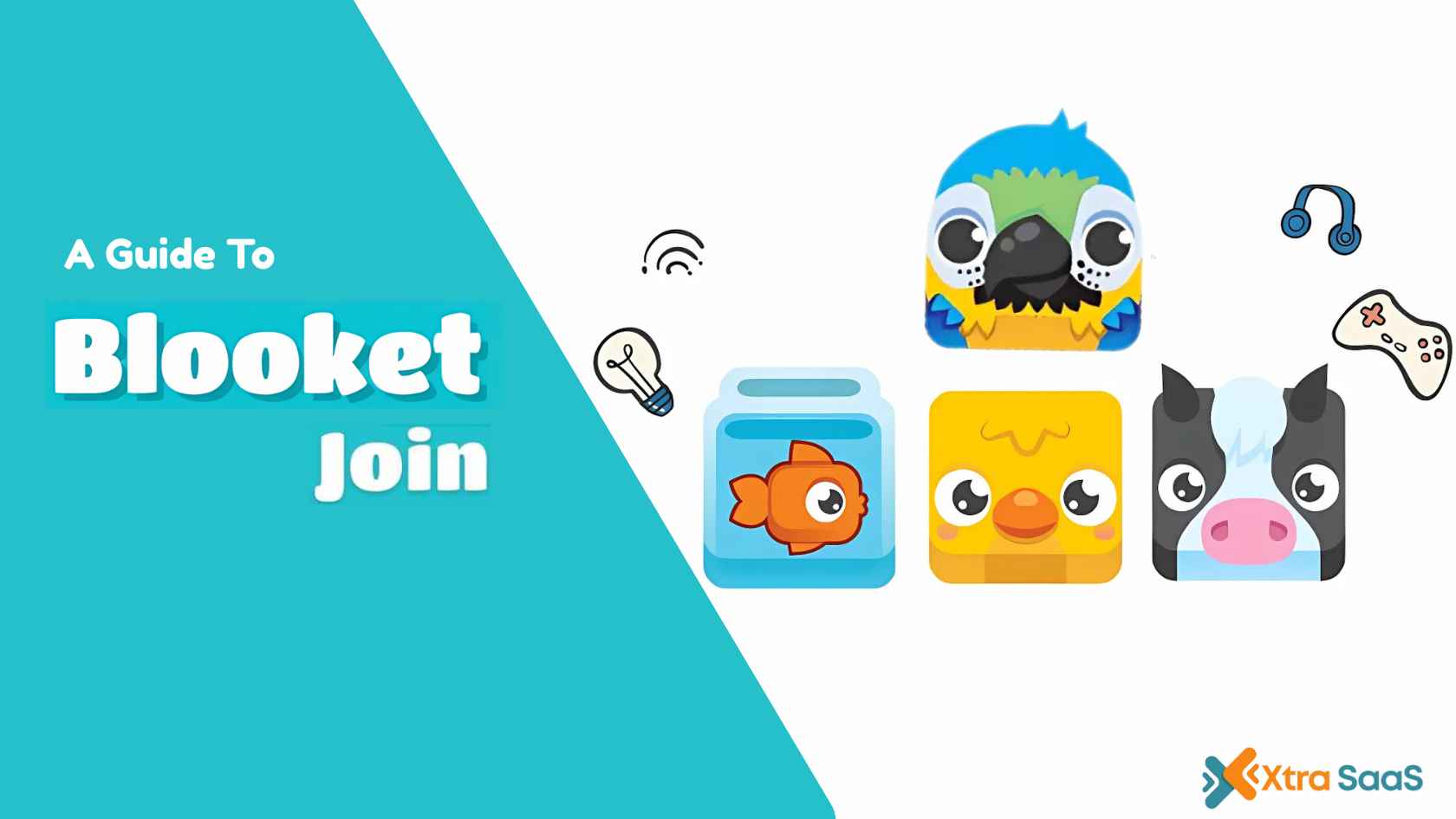In the software-as-a-service (SaaS) world, stellar customer support can make or break your startup. Why? SaaS companies rely on recurring revenue – if customers aren’t happy, they churn. Studies show 89% of consumers are more likely to make another purchase after a positive customer service experience. Exceptional support builds trust, keeps users around, and turns them into evangelists for your product. For startup SaaS companies, support isn’t overhead — it is revenue protection.
Below, we break down actionable Salesforce support strategies every early to mid-stage SaaS startup should master. These strategies will help you leverage Salesforce – a leading Customer Relationship Management (CRM) platform – to deliver efficient, personalized, and scalable support. Let’s dive in!
Why Salesforce-Powered Support Matters for SaaS Startups
Salesforce as your support backbone: Salesforce isn’t just for sales teams – it can be the central hub of your customer support. Companies that treat Salesforce as the foundation of their customer operations gain a 360° view of each customer’s lifecycle, enabling more personalized and proactive support.

Customer experience = Growth: In SaaS, happy customers drive growth through renewals and referrals. On the flip side, poor support can snuff out growth – more than half of consumers will leave after a single bad experience. For an emerging SaaS business, even a handful of bad support interactions can hurt reputation internationally. By using Salesforce support, you can standardize quality and deliver consistent experiences that meet the high expectations of today’s customers.
Strategy 1: Cultivate a Customer-Centric Support Culture
One major advantage of using Salesforce is having all customer data at your fingertips. Before responding to a support query, encourage agents (or whoever is handling support) to review the customer’s profile, past interactions, and usage history in Salesforce. This context allows you to tailor your assistance. For example, address customers by name and reference their last support issue or recent activity.
Salesforce Service Cloud provides that full context so you can treat customers like valued individuals. Small startups can excel here: even if you have few customers initially, use that intimacy to your advantage by delivering concierge-level service.

Strategy 2: Implement Omnichannel Support with Salesforce
Today’s customers want to reach you on their terms – whether that’s email, live chat, phone, or social media. As a SaaS startup with a global audience, you should be ready to support users across multiple channels. Salesforce Service Cloud makes this achievable through its omnichannel capabilities, which let you manage all support channels in one unified platform.
The payoff is huge: a Zendesk report found 92% of customers feel satisfied when using live chat support (versus 88% for phone and 85% for email). In other words, offering the right channels can boost satisfaction.
Strategy 3: Empower Customers with Self-Service Options
In an ideal world, customers could resolve many issues themselves without needing support—and for startups, this is often achievable. Self-service support benefits both users and teams: customers get instant, 24/7 help, and your team handles fewer tickets. Tools like Salesforce’s Knowledge Base and community forums make scalable self-service possible. Start by creating a knowledge base with articles covering your most common support topics, and embed it directly in your product through a “Help” widget or portal to keep assistance easily accessible.
You can also build a customer community forum using tools like Salesforce Experience Cloud, where users exchange tips and help each other—reducing support volume while fostering engagement. Another powerful option is AI chatbots, such as Salesforce Einstein Bots. These bots can answer frequent questions, guide users to help articles, and handle simple tasks like checking ticket statuses or resetting passwords, providing support around the clock—even at 2 AM.
Strategy 4: Leverage Automation and AI to Scale Support
As your startup grows, the volume of support requests will grow too – but that doesn’t mean your headcount must skyrocket at the same pace. Smart automation and AI built by Salesforce Commerce Cloud Developer into Salesforce can help you scale your support operations in ecommerce efficiently. The idea is to let machines handle the repetitive, time-consuming tasks (or even predict customer needs) so your human team can concentrate on high-value interactions.

First, identify support tasks that are manual and repetitive – these are prime candidates for automation using Salesforce. Another tip: set up auto-responders and self-help suggestions. If a customer emails support, Salesforce can auto-reply with, “Got it, here’s a help article that might resolve your issue immediately.” This kind of workflow can deflect tickets proactively. Automation essentially acts as your first line of support triage.
Strategy 5: Train and Empower Your Support Team
Even the best tools won’t shine without knowledgeable people behind them. For SaaS startups, investing in your support team’s training and empowerment is a strategy that pays dividends in customer satisfaction. Your team needs the skills to use Salesforce effectively, the product expertise to tackle user questions, and the authority to solve issues without needless escalation. A well-trained, motivated support team can turn every customer interaction into a positive experience that sets you apart.
Make ongoing training a core part of your support strategy. Start with Salesforce itself: ensure your support reps (or anyone handling tickets) are comfortable with the Service Cloud console, case management, knowledge base usage, and any custom dashboards you set up. Salesforce offers free training modules via Trailhead – encourage your team to complete relevant trails (e.g., Customer Service Basics or Service Cloud for Lightning). As Salesforce updates roll out new features, keep the team informed so you can leverage improvements (like a new Einstein AI feature) early. Equally important is training on your own product. SaaS platforms evolve rapidly with new features and fixes, so schedule regular internal sessions to brief support folks on product changes. Well-trained support reps will resolve issues faster and boost customer confidence in your company.
Strategy 6: Track Metrics and Close the Feedback Loop
You can’t improve what you don’t measure. Successful SaaS startups treat support as a continuously improving system, using data and customer feedback to refine their approach over time. Salesforce makes it easy to track key support metrics and gather feedback at scale. By monitoring performance and listening to customers, you can identify weak spots in your support experience and fix them – boosting efficiency and satisfaction.

Define a handful of Key Performance Indicators (KPIs) that align with your support goals, and use Salesforce reports/dashboards to track them religiously. Salesforce’s reporting can slice these by time period, agent, issue type, etc., giving you actionable insights. Aim to benchmark against industry standards: if customers expect a response in under an hour, try to meet that. Additionally, track case backlog and reopen rates – too many reopened cases might indicate solutions aren’t effective.
The importance of measuring can’t be overstated: 80% of customer service organizations use customer satisfaction scores as their primary metric, and those that excel at service grow revenues 4–8% above their market on average. Use these insights to make adjustments, like improving your knowledge base for a certain issue or reassigning resources.
Conclusion: Turning Support into a Startup Superpower
Customer support isn’t just about fixing issues – it’s about building relationships and trust. For SaaS startups operating on the international stage, mastering these Salesforce-driven support strategies can become a true competitive advantage. We discussed how cultivating a customer-centric culture sets the foundation for empathy and excellence. We saw that leveraging Salesforce for omnichannel support, self-service resources, and AI-driven automation allows a small team to deliver big results. We highlighted the importance of training your people and measuring your performance to keep improving.
By implementing these best practices, you transform support from a cost center into a growth engine. Happy customers stick around longer, upgrade their plans, and recommend you to others. In the fast-paced SaaS world, companies that prioritize customer success through outstanding support will outpace those that don’t. So make support excellence part of your startup’s DNA. With Salesforce as your ally and the strategies above as your roadmap, you can deliver the kind of support that not only solves problems but wows customers at every turn – and that’s a formula for SaaS success that scales.










